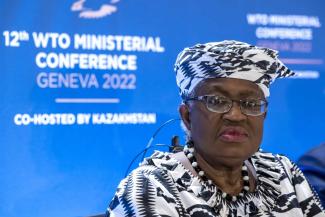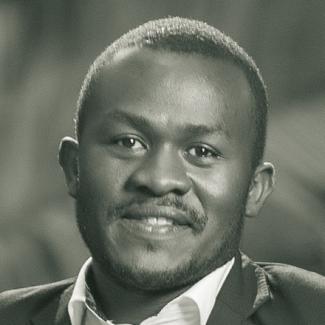International trade
The WTO has not collapsed, but it does look shaky
 picture-alliance/EPA/Martial Trezzini
picture-alliance/EPA/Martial Trezzini
When the WTO was formed in 1995, “globalisation” became a buzzword in Africa. The subtext was that, after the cold war, a new era of liberalisation had supposedly begun. Henceforth, the same rules would apply to everyone on the world market and free trade would drive growth (see José Siaba Serrate on www.dandc.eu).
Before the WTO, the General Agreement on Tariffs and Trade (GATT) had regulated international trade. However, it had started as a club of western high-income countries and had mostly adopted rules that suited them. The WTO, by contrast, was supposed to have a truly global membership. With more than 160 sovereign members, that is indeed now the case.
The big promise
The big promise of globalisation was that every nation would prosper. Indeed, there was some progress for developing countries. For example, trade barriers that protected textile and garments production in high-income nations were terminated. The GATT’s multi-fibre agreement ended in 1994 and its less oppressive successor expired in 2005.
Moreover, new global rules on agriculture subsidies have limited – though not ended – destructive practices in Europe, North America and Japan, where governments had stimulated farm production with high subsidies and then paid even more subsidies to export surplus goods to poorer nations. Such “dumping” obviously hurt African, Asian and Latin American farmers. Gradual change began before the GATT became the WTO and continued later, certainly making the WTO attractive to developing and emerging economies.
Guarding the rules
In 1995, the idea was thus to use the WTO to further liberalise global trade. Reforms were to be adopted by consensus of all members. Decisions must indeed be taken unanimously, with each member country having one vote. Unlike most UN agencies, moreover, the WTO is a guardian of its rules. It has a dispute settlement system, and its arbitrators can allow litigants to impose tariffs on partners who do not comply with WTO rule.
Things did not come as planned. In 1999, a ministerial summit in Seattle ended in acrimony. Representatives from developing countries were appalled that they were not involved properly when their counterparts from the EU and the US tried to settle agriculture disputes among themselves. Moreover, riots in the streets showed that ever more deregulation geared to increasingly open trade was controversial even in the USA, the country that had always been a standard bearer of free trade.
The next summit in Qatar in 2001 did not fail in such a spectacular manner. Some progress regarding agriculture subsidies was made, for example, and the summit agreed to launch the Doha Development Round. The promise was that a series of negotiations and summits would result in rules to make trade easier for developing countries.
It turned out to be a dead-end Road
In the longer run, however, the experience was disappointing, especially in the eyes of policymakers from low and middle-income countries. Before the summit in Qatar, high-income nations had insisted that the international community needed a single and coherent trade regime. After the event, however, both the US and the EU started bilateral trade initiatives.
The reason was that they had wanted to include issues such as competition policy, investment rules, government procurement and trade facilitation in the Doha Development Round. Less prosperous WTO members, however, had rejected these so called “Singapore issues”, fearing that new rules on these issues would hurt, rather than serve their interests.
Before 2001, the high-income nations had warned against a confusing “spaghetti bowl” of many competing and overlapping rules that would result from a host of bilateral trade agreements. After 2001, they prioritised bilateral talks which included Singapore issues over multilateral WTO negotiations. The Doha Development Round largely turned out to be a dead-end road, even though a deal on trade facilitation was eventually struck in 2013, streamlining customs procedures and other minor matters.
Another Doha decision resulted in disappointment too. The summit agreed that governments should be entitled to granting compulsory licences for the production of patented pharmaceuticals should that be needed for public-health purposes. The background was that large emerging markets needed such medications in view of the HIV/AIDS crisis. This decision, however, never became fully operational. The WTO never adopted the necessary mechanisms. On the other hand, patent-holding pharma corporations made their products available at lower prices. However, the debate re-erupted in the context of Covid-19 vaccines 20 years later (see interview with Achal Prabhala on www.dandc.eu).
A multilateral organisation losing its teeth
While the WTO did not prove to be an engine of further globalisation, it was not toothless either. For many years, its trade-litigation mechanism meant that the existing WTO rules did have some bite. That changed under US President Donald Trump however. His administration not only resorted to imposing trade sanctions unilaterally, but also crippled the WTO’s dispute-settlement system by blocking appointments of new adjudicators (see Hans Dembowski on www.dandc.eu).
The US thus sent the clear message to all other countries that any WTO member that had sufficient leverage was free to ignore multilateral rules. Trump’s primary motive was the growing rivalry of the USA with China. However, US policymakers were disappointed in unrelated decisions made by WTO arbitrators as well.
In African eyes, the trend of WTO erosion is most worrisome (see Kacana Sipangule and Mwanda Phirihttps on www.dandc.eu). To some extent, forming regional trade blocks can help. Moreover, after long excruciating talks, economic partnership agreements with the EU have proven to be more development-friendly than originally feared feared (see Monika Hellstern on www.dandc.eu). Since humanity needs global rules for global issues, however, the multilateral institution is indispensable.
While the WTO and its trade regime have not collapsed, both look shaky at a time when the international community is rocked by multiple crises. The Covid-19 pandemic has disrupted the supply chains many economies depend on. The climate emergency is escalating, with extreme weather events causing increasing damage around the world. Inflation is a resurgent phenomenon. Various countries are once again struggling with sovereign-debt issues. Russia’s invasion of Ukraine has compounded problems.
This year’s minor progress
In this troubled setting, this year’s ministerial conference in Geneva did deliver some minor results:
- The summit decided to prohibit subsidies for illegal fishing. This may sound absurd, but the background is that, so far, governments with the fiscal power to pay subsidies typically do not care much about where exactly fish is caught in far-away waters. Moreover, subsidies for fishing on high seas is to be discontinued too. These are relevant, though insufficient steps towards better management of maritime resources.
- The summit also agreed that export restrictions for food must not apply to purchases of the World Food Programme, making it a little easier to provide supplies to regions threatened by hunger.
- Patents for Covid-19 vaccines have been temporarily suspended. However, non-governmental observers bemoan that other relevant intellectual-property rights remain in force, so the decision will make little difference for practical purposes (see Anton Sundberg and Andreas Wulf on www.dandc.eu).
- Partners agreed to sort out the dispute-settlement controversy within two years in order to appoint new adjudicators.
All summed up, these decisions are better than nothing, but they are too meagre to add up to a convincing effort to fully reinvigorate the ailing multilateral organisation. As Bernd Ludermann argued in the German magazine welt-sichten, the summit result shows that many members are more afraid of the WTO’s death than of its prolonged wasting away.
In Doha 21 years ago, the Afghanistan war had focused the minds of summit participants. This time, the Ukraine war may have served the same function. While there is no consensus on decisive trade rules, member countries’ diplomats decided in Geneva that, at this point, they did not want to destabilise the global system any further.
Alphonce Shiundu is a Nairobi-based journalist and fact-checker.
Hans Dembowski is editor in chief of D+C Development and Cooperation / E+Z Entwicklung und Zusammenarbeit.
euz.editor@dandc.eu

